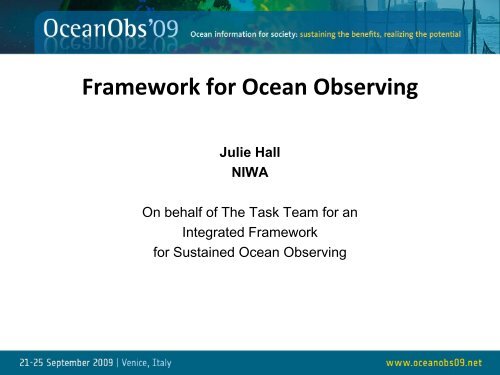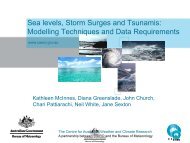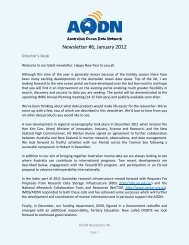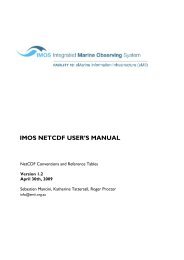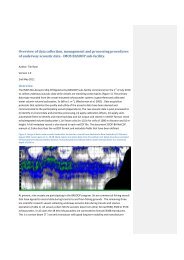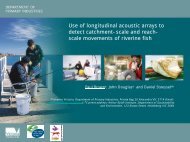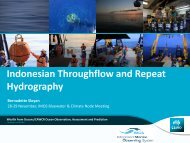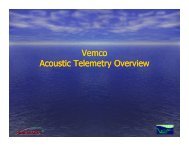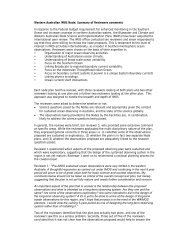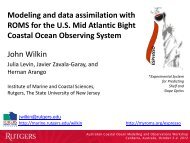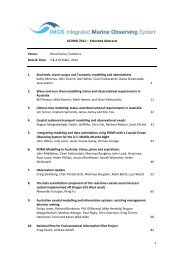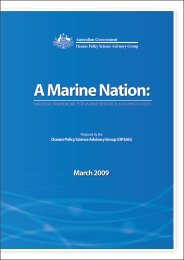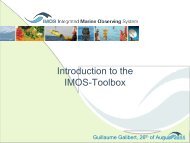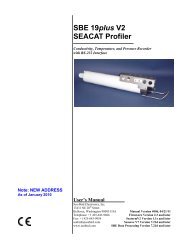Framework - Introducing IMOS
Framework - Introducing IMOS
Framework - Introducing IMOS
You also want an ePaper? Increase the reach of your titles
YUMPU automatically turns print PDFs into web optimized ePapers that Google loves.
<strong>Framework</strong> for Ocean Observing<br />
Julie Hall<br />
NIWA<br />
On behalf of The Task Team for an<br />
Integrated <strong>Framework</strong><br />
for Sustained Ocean Observing<br />
1
Sponsorship<br />
• IOC Intergovernmental Oceanographic Commission of UNESCO<br />
• GEO Group on Earth Observations<br />
• CEOS Committee on Earth Observation Satellites<br />
• POGO Partnership for Observation of the Global Oceans<br />
• SCOR Scientific Committee on Oceanic Research<br />
• SCAR Scientific Committee on Antarctic Research<br />
• GCOS Global Climate Observing System<br />
• GOOS Global Ocean Observing System<br />
• JCOMM Joint WMO-IOC Technical Commission for Oceanography and Marine<br />
Meteorology<br />
• PICES North Pacific Marine Science Organization<br />
• ICES International Council for the Exploration of the Sea<br />
• CoML Census of Marine Life<br />
• IGBP International Geosphere-Biosphere Programme<br />
• WCRP World Climate Research Programme<br />
2
Task Team on an Integrated <strong>Framework</strong> for<br />
Sustained Ocean Observing<br />
Recommend a framework for moving global sustained ocean<br />
observations forward in the next decade; integrating feasible<br />
new biogeochemical, ecosystem, and physical observations<br />
while sustaining present observations; considering how best to<br />
take advantage of existing structures<br />
3
A Simple System<br />
Input<br />
(Requirements)<br />
Output<br />
(Data &<br />
Products)<br />
Process<br />
(Observations)
A Simple System<br />
Input<br />
(Requirements)<br />
Output<br />
(Data &<br />
Products)<br />
Process<br />
(Observations)
Structure of the <strong>Framework</strong><br />
Issues<br />
Requirement<br />
What to Measure<br />
Essential Ocean Climate Variables<br />
Issues Impact<br />
Data Products<br />
Data Assembly<br />
Argo<br />
<strong>IMOS</strong><br />
SOOP<br />
VOS<br />
SOOS<br />
Satellite<br />
Constellation<br />
Satellite<br />
…<br />
…<br />
…<br />
…<br />
…<br />
Observations<br />
…<br />
…<br />
…<br />
…
<strong>Framework</strong>: Societal Driver 2010<br />
Weather & Climate<br />
•UNFCCC/IPCC<br />
•WCRP<br />
• GOOS-SSC<br />
• JCOMM<br />
• OOPC<br />
• IOCCP<br />
• IODE
<strong>Framework</strong>: Societal Drivers Next Decade<br />
Regional<br />
•Regional Seas<br />
•CCAMLR<br />
Fisheries<br />
•FAO<br />
•RFMOs<br />
Ecosystem<br />
services/<br />
Biology<br />
•CBD<br />
•CSD<br />
•WSSD<br />
Assessments<br />
•Global Marine (UN)<br />
•TWAP (GEF)<br />
•Regional<br />
Real-time services<br />
•Emergency support<br />
•Ocean forecasting<br />
Weather & Climate<br />
•UNFCCC/IPCC<br />
•WCRP<br />
•Climate services<br />
Requirements<br />
Expanded EOVs<br />
Data Products<br />
Expanded observing<br />
systems and<br />
networks
Readiness Levels
Readiness Levels<br />
Sea Surface Temperature
Readiness Levels<br />
Ocean Acidification C Suite
Readiness Levels<br />
Zooplankton
Key Concepts of the <strong>Framework</strong><br />
• Articulates ‘best practices of a systems approach’ for<br />
building an enlarged and interoperable system<br />
• Establishes “Essential Ocean Variables (EOVs)” as basis for<br />
building new elements of the system.<br />
• Argues that an “Integrated Observing System” will be a<br />
derivative of an EOV-based approach driven by requirements.<br />
• Proposes an approach to introducing new components of the<br />
system through a number of “Readiness Levels”
Implementing the <strong>Framework</strong>:<br />
Aligning Organizations<br />
• The team considered several approaches for governing the<br />
<strong>Framework</strong><br />
– Characterized by Simplicity<br />
– Based on Functional Needs<br />
– Bring Stakeholders Together<br />
– Nominal Operating Costs<br />
• Requires ongoing engagement of international sponsors and<br />
other bodies<br />
• Recommends establishment of a <strong>Framework</strong> Steering<br />
Committee
Governance Structure<br />
Steering Committee<br />
( Sponsors, Observing Panel Chairs, Observing System<br />
leaders)<br />
Observing System Panels<br />
(e.g., Physics, Biology, Biogeochemistry)<br />
Technical Advisory Groups<br />
(e.g., Observing technologies, data, and data products)
www.ococeanobs09.net/wg
The<br />
Southern Ocean<br />
Observing System<br />
Louise Newman<br />
SOOS International Project Office<br />
On behalf of many SOOS colleagues<br />
April 2011
The SOOS<br />
Grew from years of input and discussion by international scientific<br />
community<br />
Community developed a very ambitious SOOS Initial Science and<br />
Implementation Strategy<br />
The SOOS International Project Office opened in August 2011:<br />
Hosted by the Institute for Marine and Antarctic Studies (University<br />
of Tasmania), with additional support from the Australian Antarctic<br />
Division<br />
The SOOS is a joint SCAR and SCOR initiative
SOOS Mission<br />
•To establish a multidisciplinary system to deliver the sustained<br />
observations of the Southern Ocean that are needed to address<br />
key challenges of scientific and societal relevance, including<br />
climate change, sea-level rise and the impacts of global change<br />
on marine ecosystems.
Objectives<br />
1) Development of optimal sampling plans<br />
for essential SO variables<br />
2) Advocating and guiding the development<br />
of new observation technologies<br />
3) Streamlining of current efforts and<br />
leveraging of resources<br />
4) Effective integration and coordination of<br />
national and international projects and<br />
programs, across traditional disciplinary<br />
boundaries and between nations<br />
5) Facilitation and development of a data<br />
system that provides seamless access to<br />
a wide range of data products for the SO<br />
AAD Photo Library
Science Themes<br />
• Key science challenges to be addressed by<br />
the SOOS:<br />
1) Role of Southern Ocean in global freshwater<br />
balance<br />
2) Stability of Southern Ocean overturning<br />
3) Stability of Antarctic ice sheet and future<br />
contribution to sea-level rise<br />
4) Future of Southern Ocean carbon uptake<br />
5) Future of Antarctic sea ice<br />
6) Impacts of global change on Antarctic<br />
ecosystems<br />
AAD Photo Library
Progress so far…<br />
AAD Photo Library
Progress so far…<br />
- SOOS Science Plan and Implementation Strategy – currently being<br />
published, available for download from SCAR and SCOR website<br />
(within next few weeks)<br />
- SOOS Website: www.soos.aq up and running by end of<br />
January<br />
- Scientific Steering Committee: Selected from international<br />
call for nominations
Scientific Steering Committee<br />
Scientific Members<br />
**<br />
Ex-officio Members
Progress so far…<br />
- SOOS Science Plan and Implementation Strategy – currently being<br />
published, available for download from SCAR and SCOR website<br />
- SOOS Website: www.soos.aq up and running by end of<br />
January<br />
- Scientific Steering Committee: Selected from international<br />
call for nominations<br />
- 1 st Scientific Steering Committee meeting: 18-19 February<br />
2012, Salt Lake City, Utah, USA<br />
Key objective of meeting is to move on from<br />
the implementation strategy towards developing a detailed<br />
implementation plan
International<br />
Project Office:<br />
Contact<br />
• Louise Newman (Executive<br />
Officer)<br />
• Louise.Newman@utas.edu.au<br />
The Australian<br />
Antarctic Division


